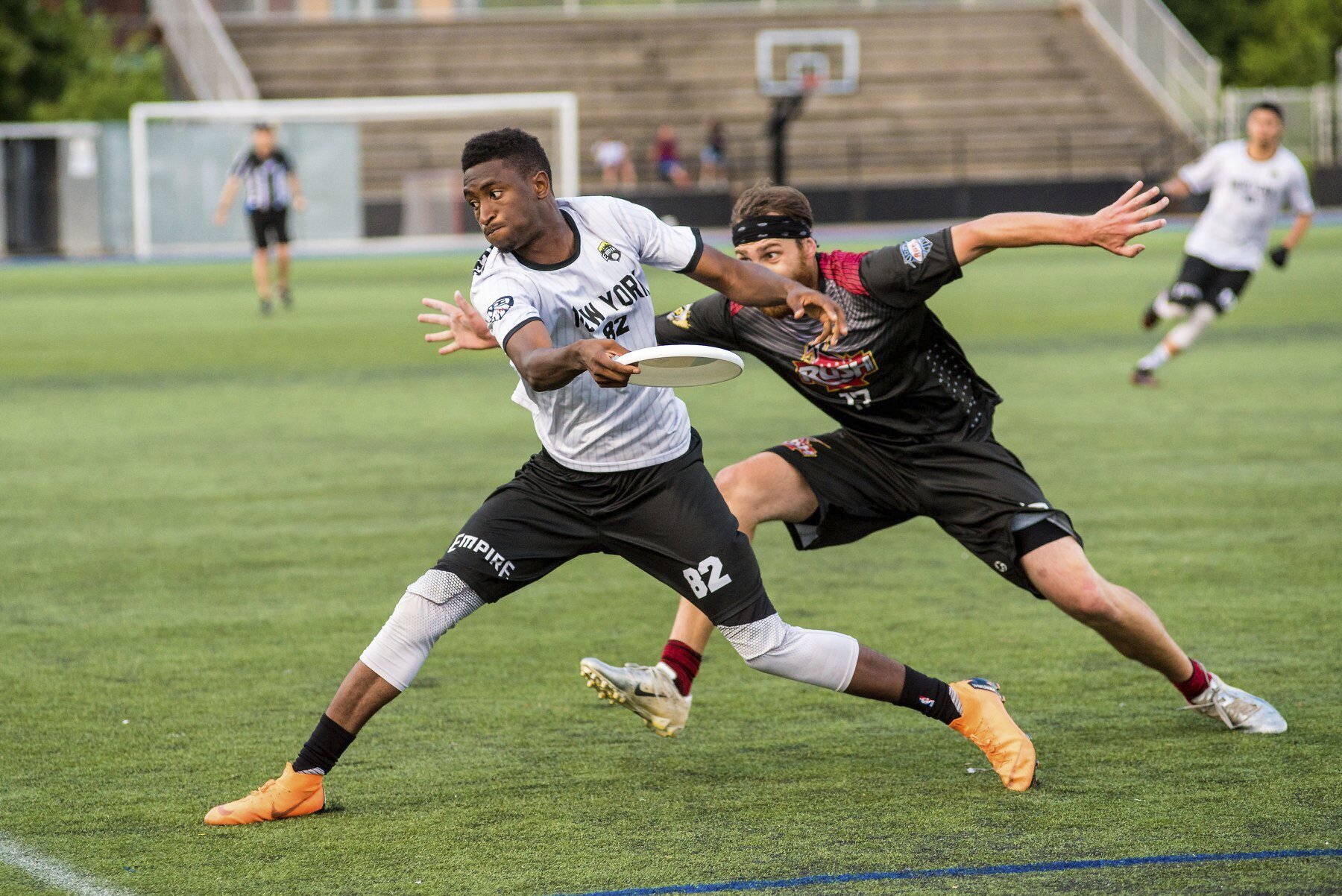
Welcome to the world of Ultimate Frisbee, a dynamic and spirited sport that has captured the hearts of players and fans worldwide. From its humble beginnings in a New Jersey high school to the global stage, Ultimate Frisbee has evolved into a game that blends athleticism, strategy, and a unique emphasis on fair play. In this exploration, we’ll delve into the history, rules, and significant milestones that define Ultimate Frisbee. From the iconic tournaments that showcase the sport’s elite to the grassroots efforts promoting inclusivity and diversity, join us on a journey through the fascinating realm of Ultimate Frisbee. Whether you’re a seasoned player, a curious spectator, or someone discovering the sport for the first time, there’s something for everyone in the world of Ultimate Frisbee.
Origin: Ultimate Frisbee, with its roots in Columbia High School in Maplewood, New Jersey, emerged as a casual game played with a simple flying disc. Joel Silver, Jared Kass, and their fellow students invented the sport in 1968, blending elements of soccer, basketball, and American football. What began as a playful pastime soon evolved into a structured sport, gaining popularity not only in schools but also in organized leagues and international competitions.
Founding Organization: The establishment of the World Flying Disc Federation (WFDF) in 1985 marked a pivotal moment in Ultimate Frisbee’s global development. As the governing body for flying disc sports, the WFDF fosters international cooperation, standardizes rules, and organizes prestigious tournaments, contributing to the sport’s recognition and growth on the global stage.
Seven-a-Side: The seven-a-side format in Ultimate Frisbee reflects a deliberate emphasis on teamwork and strategic gameplay. This dynamic composition ensures that players need to collaborate efficiently, emphasizing quick passes and well-coordinated movements to outmaneuver opponents. The format also provides a balance between offense and defense, contributing to the sport’s fast-paced and exciting nature.
Spirit of the Game: The “Spirit of the Game” is a fundamental aspect that sets Ultimate Frisbee apart from many other sports. Enshrined in the rules, this ethos promotes sportsmanship, integrity, and mutual respect among players. The reliance on self-officiation and the absence of referees underscore the commitment to fair play and personal responsibility on the field.
Field Dimensions: The carefully defined dimensions of the Ultimate Frisbee field, 70 yards in length with 25-yard end zones, contribute to the strategic nature of the game. The width of 40 yards accommodates the dynamic movements of the players, allowing for a balance between offensive drives and defensive maneuvers.
Scoring: Scoring in Ultimate Frisbee occurs when a player successfully catches the Frisbee in the opposing team’s end zone, earning one point for their team. This straightforward scoring system adds an element of precision to the game, where well-timed throws and strategic positioning play a crucial role in securing points.
Pull: The commencement of each point with a “pull” sets the tone for the game. The team that scored the previous point initiates the action by throwing the Frisbee to the opposing team. The pull requires precision and strategic planning, as it determines the starting position for both teams and influences the initial dynamics of the game.
Stall Count: The stall count rule, limiting players to ten seconds to release the Frisbee after receiving it, adds an element of urgency to the game. This rule prevents stalling tactics and encourages quick decision-making, contributing to the fast-paced and fluid nature of Ultimate Frisbee.
Turnover: The concept of turnover, where possession changes due to various factors such as dropped passes or rule violations, underscores the importance of skill and precision. Turnovers create dynamic shifts in the game, offering opportunities for both offensive and defensive strategies to come into play.
World Ultimate Club Championships: The inception of the World Ultimate Club Championships in 1989 elevated Ultimate Frisbee to a global stage. This quadrennial tournament brings together elite club teams from around the world, fostering international competition and camaraderie. The event showcases the highest level of play in Ultimate Frisbee, highlighting the sport’s evolution and its vibrant community.
Skyd Magazine: Founded in 2012, Skyd Magazine has become an invaluable resource for the Ultimate Frisbee community. Operating primarily online, Skyd Magazine covers a wide range of topics, including news, analysis, feature articles, and community engagement. Its emergence has played a crucial role in providing a platform for discussions, debates, and the exchange of ideas within the global Ultimate Frisbee community. The magazine’s commitment to in-depth coverage and its interactive nature have contributed significantly to the growth and cohesion of the sport’s diverse and passionate community.
College Ultimate: The USA Ultimate College Championships, an annual showcase of collegiate Ultimate talent in the United States, has become a pinnacle event in the sport. Bringing together top college teams, the championships provide a platform for emerging players to display their skills and compete at a high level. The tournament not only fosters competition but also serves as a breeding ground for talent that often transitions to elite club and international play, shaping the future of Ultimate Frisbee.
Major League Ultimate (MLU): The Major League Ultimate (MLU), which operated from 2012 to 2016, was a pioneering venture in establishing a professional Ultimate Frisbee league in the United States. This initiative aimed to elevate the sport’s profile, offering players the opportunity to compete at a professional level and providing fans with a structured and entertaining viewing experience. While the MLU faced challenges and ultimately ceased operations, it contributed to the conversation around professionalizing Ultimate Frisbee.
American Ultimate Disc League (AUDL): The American Ultimate Disc League (AUDL), founded in 2012, currently stands as a prominent professional men’s Ultimate Frisbee league in the United States and Canada. The league’s structure, with franchises located across North America, has brought a new level of visibility and professionalism to the sport. The AUDL’s ongoing success highlights the potential for sustained professional Ultimate Frisbee leagues to thrive and engage fans on a broader scale.
First International Tournament: In 1975, Yale University hosted the first international Ultimate Frisbee tournament, marking a significant milestone in the sport’s global expansion. Teams from the United States and Canada participated, laying the foundation for future international competitions. The tournament not only showcased the evolving skills of Ultimate players but also fostered cross-cultural exchanges and friendships within the growing global Ultimate Frisbee community.
Greatest Distance Thrown: David Wiggins Jr. etched his name into Ultimate Frisbee history in 2014 by achieving the longest recorded throw of a Frisbee. With an astonishing distance of 338 meters (1,109 feet), this feat demonstrated the potential for incredible throws and highlighted the athleticism and precision that players can bring to the sport.
World Record for Continuous Play: In 2012, a group of dedicated Ultimate Frisbee players set a remarkable world record for continuous play, lasting an impressive 26 hours, 17 minutes, and 22 seconds. This endurance feat not only showcased the physical demands of the sport but also the unwavering passion and camaraderie within the Ultimate Frisbee community.
First Ultimate Frisbee Association: The establishment of the Ultimate Players Association (now USA Ultimate) in 1979 marked a pivotal moment in the sport’s organizational history. The association’s formation aimed to provide structure, standardize rules, and promote the growth of Ultimate Frisbee. Over the years, USA Ultimate has played a crucial role in shaping the sport’s development, overseeing national competitions, and advocating for its inclusion in the broader sports landscape.
Olympic Recognition: While not yet an Olympic sport, Ultimate Frisbee has made strides toward Olympic recognition. In 2015, the International Olympic Committee officially recognized the World Flying Disc Federation (WFDF), marking an essential step in the sport’s journey toward potential inclusion in future Olympic Games. This recognition acknowledges Ultimate Frisbee’s global appeal and aligns with the sport’s ethos of inclusivity and spirited competition.
Mixed Gender Teams: A distinctive feature of Ultimate Frisbee is the emphasis on mixed-gender teams, challenging traditional sports norms. This inclusive approach promotes gender equity, encouraging men and women to play together on the same team. Mixed gender Ultimate not only fosters a cooperative and diverse playing environment but also contributes to breaking down gender barriers within the sports world, setting an example for inclusivity in team sports.
Callahan Award: Instituted in 1996, the Callahan Award has become a prestigious accolade within collegiate Ultimate Frisbee. Named after Henry Callahan, one of the sport’s early pioneers, the award recognizes the top male and female college Ultimate players in the United States. Winners exemplify exceptional skills, leadership, and the Spirit of the Game, becoming ambassadors for the sport and leaving a lasting impact on the collegiate Ultimate Frisbee community.
Spirit Scores: In Ultimate Frisbee, teams are not only evaluated based on their on-field performance but also receive “spirit scores.” This unique aspect of the sport emphasizes the Spirit of the Game principles, encouraging fair play, sportsmanship, and mutual respect among players. Spirit scores, determined through player evaluations and discussions, contribute to a positive and respectful playing environment, fostering a sense of camaraderie and community within the Ultimate Frisbee culture.
Equity, Diversity, and Inclusion: The Ultimate Frisbee community actively promotes equity, diversity, and inclusion initiatives. Recognizing the sport’s potential as a platform for positive social change, organizations and players advocate for greater representation and access to Ultimate Frisbee across diverse communities. Efforts to break down barriers, challenge stereotypes, and create inclusive spaces within the sport align with its foundational principles of fairness and respect.
First Professional Ultimate Frisbee Athlete: Beau Kittredge made history in 2012 by becoming the first professional Ultimate Frisbee athlete. Signing a contract with the San Jose Spiders in the AUDL, Kittredge’s entry into the professional realm marked a significant milestone for the sport. His athleticism and skill set a standard for the professionalization of Ultimate Frisbee, influencing subsequent players to pursue careers in the sport at a higher level of competition.
Frisbee as a Sport: The International Olympic Committee’s official recognition of the World Flying Disc Federation (WFDF) in 2015 marked a crucial step in Ultimate Frisbee’s journey toward potential inclusion in future Olympic Games. While the sport has not yet reached the Olympic stage, this recognition acknowledges Ultimate Frisbee as a legitimate and globally appealing athletic discipline. The possibility of inclusion in the Olympics reflects the sport’s growth, competitive spirit, and commitment to the values of fair play and inclusivity on the international sporting landscape.
Ultimate Frisbee FAQs: Catching the Basics (and the Disc)
Ultimate Frisbee is a fast-paced and exciting sport that combines elements of soccer, basketball, and football (American). Here are some of the most common questions people have about Ultimate Frisbee:
1. What is the objective of Ultimate Frisbee?
The objective of Ultimate Frisbee is to score points by completing a pass in the opponent’s end zone, similar to American football. Each team has seven players on the field at a time and tries to advance the disc down the field by throwing and catching.
2. How many players are on a team?
A typical Ultimate Frisbee game involves two teams with seven players on the field each. However, teams can have substitutes and a larger roster of players who can rotate in and out throughout the game.
3. What are the basic rules of Ultimate Frisbee?
- The disc can’t be run with: Players can only pivot with one foot on the ground while holding the disc. They have ten seconds to throw the disc after catching it.
- Completing a pass: A pass is complete when a teammate catches the disc in bounds. Dropping the disc, incomplete passes, or the disc going out of bounds are turnovers.
- Defense and fouls: Defense is played with a “force” technique, where defenders try to deflect passes but cannot make physical contact with the offensive player. Fouls are called for excessive contact, guarding too closely, or intentional disc blocking.
- Self-officiating: Ultimate emphasizes sportsmanship and fair play. Players are responsible for calling their own fouls, leading to a more spirit-of-the-game approach.
4. How long is a typical Ultimate Frisbee game?
Games are typically played to 15 points, with a halftime point reached when one team reaches 7 points. The actual length of the game can vary depending on the score and the number of stoppages in play. Competitive games might last an hour and a half, while recreational games might be shorter.
5. What equipment do I need to play Ultimate Frisbee?
All you really need to play Ultimate Frisbee is a disc! A standard 175-gram disc is used in most games. Cleats or athletic shoes are helpful for playing outdoors, and comfortable clothing is recommended.
6. How can I get started playing Ultimate Frisbee?
Many communities have local Ultimate Frisbee leagues or pickup games. You can search online for Ultimate Frisbee clubs or associations in your area. Many parks and fields also have regular pickup games, which is a great way to learn the basics and meet other players.
Here are some resources to help you get started:
- USA Ultimate: https://play.usaultimate.org/events/tournament/
- Ultimate Central: https://ultimatecentral.com/
7. I’m not very athletic, can I still play Ultimate Frisbee?
Absolutely! Ultimate Frisbee is a great sport for people of all skill levels. The emphasis on sportsmanship and fair play creates a welcoming environment for beginners. The running involved can be adjusted based on your fitness level, and there are different playing styles to suit various strengths.
8. What are some of the benefits of playing Ultimate Frisbee?
Ultimate Frisbee offers a great workout, combining cardio, agility, and hand-eye coordination. It’s also a social sport that can help you meet new people and build teamwork skills. The self-officiating aspect fosters sportsmanship and fair play.
Hopefully, this FAQ has given you a good introduction to the exciting world of Ultimate Frisbee! Whether you’re a seasoned athlete or a curious beginner, Ultimate offers a fun and rewarding way to get active and enjoy some friendly competition.








